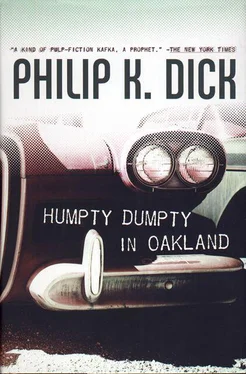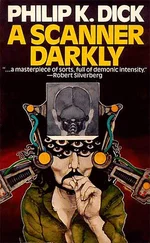Coming over to Al, Bob Ross said, “Who is this old guy?”
Al said, “He owns a garage.”
“Oh,” Ross said, with a knowing expression. “I remember. Chris mentioned him. He’s retired, isn’t he?”
Al said, “No, he’s just getting started.”
“I think I recall,” Ross said. He puffed several deep puffs on his pipe. “Well, I guess we don’t get up to Petaluma today.”
Seated in the middle of the couch in Chris Harmans living room, the old man talked on and on. Al had never heard him rattle away like this before; his face shone, his eyes fixed first on Harman and then on Bob Ross and then back to Harman, and then on Mrs. Harman, and, for an instant, on Al Miller himself. He winked at Al.
“I tell you,” the old man said. He had been discussing dry and wet heat. “People say you can’t live up in Sacramento, but that’s valley heat; that’s okay. You can stand it up to a hundred and twenty if it’s dry like that. What you can’t stand is in Texas, on the gulf; that gulf wind—” He waved his hand. “That’s terrible down there.”
It was a little like the way he had buttonholed customers, Al thought. He groaned.
“What’s that from you?” the old man said at once, halting. “I mean Al Miller, there.” He gaped at Al, waiting.
Al said, “Amarillo isn’t so bad.”
Excitedly, his words tumbling over one another, the old man burst out, “That’s in north Texas, with no wind, no gulf wind. That’s exactly what I mean; that’s dry.”
“When were you ever there?” Al said.
“I was born there, around there—in Kansas. You get the same wind crossing Kansas; it’s so hot it heats up your car no matter what speed you go. You know I grew up in Kansas.”
Al said, “Yeah, but you haven’t been there for a long time.”
“It’s still the same,” Bob Ross said. “We were down that way recently to get some tapes made. At Oklahoma City.”
“Hey, Al,” the old man said. “Remember that old Packard you were driving around in when I first met you? What was that, a ’37?”
“Yeah,” Al said. “A Packard Twelve.”
“That’s how I met Al,” the old man said. “Al wanted me to fix up that Packard and keep it running forever for him. He liked that car pretty good. Didn’t you, Al? Remember that time those teenagers challenged you to a drag race? And you went up to the Black Point Road; it was around two in the morning. And you raced them in that old Packard, and you got it up to—what was it?—around ninety miles an hour, and it threw a rod. And you had to have it towed all the way back to Vallejo. How much did that cost you? You tried to get me to come and get it; I remember that. What became of that Packard, finally?”
“You know,” Al said. “The rear mains went.”
“That’s because you drove it cold.”
“Hell it was,” Al said. “It was because I took it in to you and you balanced the crankshaft wrong.”
“That’s a lot of bull,” the old man said loudly. “There isn’t anybody else in the whole world who could have kept that Packard running except me, the way you were mistreating it. Hey, you know what? Remember that kid who stole that Ford coupe off your lot? I saw him the other day. He was driving a new Olds.”
Grinning at Harman, he said, “I have to tell you about that, Harman. Al had this beat-up Ford coupe that some guy had used to haul sacks of cement and lumber; it was one of those utility coupes. It came in all battered and dirty—what’d you get it for, Al? Around seventy dollars. Anyhow, Al got it in on trade. And he took it down to this body shop—I wouldn’t touch it; he knew what shape it was in—and he paid them to repaint it. It cost him thirty dollars for that. And then he tried to get me to patch it up mechanically, but it was no good at all; the rings were completely gone—it was leaking oil all over. So anyhow, Al was determined to sell that car. He stuck it out there in front with one of those signs of his on it. Didn’t you even put an ad in the Tribune? Everybody that came onto the lot, he tried to peddle that wreck to them, but nobody’d take it. So old Al started having more and more work done on it. He took it over to some garage and made a deal with them; he had them put in new rings and regrind the valves. That must have cost him another fifty bucks. He had around two hundred in it by then. So still it didn’t sell. So he got seat covers for it. It didn’t sell. So—” The old man paused. “I think he even had a set of retreads put on it finally. Anyhow, you know what happened to it? This kid stole it and smashed it up. Nothing was left of it. Just junk. What’d you get finally, Al? Ten bucks for scrap?” He winked.
“Your brains are scrambled,” Al said. “There was no such car.”
“The hell there wasn’t,” the old man stammered, blinking.
Leaning back in his chair so that he could face Al, Chris Harman gave him a long searching glance but said nothing.
Al rose to his feet. “Pardon me,” he said.
“What is it, Al?” Harman said in his cultured voice.
“I have to go to the bathroom,” Al said.
After a pause, Harman said in the same tone, “Follow the hall. The second door to the right. Past the picture.”
“Past the Renoir,” Bob Ross said, chewing on his pipe.
“Thanks, Chris,” Al said, going down the hall.
As he shut the bathroom door and locked it, he could still hear the old man. Even in here, he thought, as he unzipped his trousers and slid them down and seated himself on the toilet seat. The sound still reached him, above his own sounds.
For a long time he remained in the bathroom, doing nothing, merely sitting with his hands together before him, hunched over so that he was comfortable. He had no thoughts in his mind, nor any awareness of time; the old man’s voice had become vague to him, with no individual words.
A rap on the door startled him; he sat up straight.
“How long are you going to be in there?” Harman said, close to the door, in a low, sharp voice.
Al said, “I don’t know. You know how these things are.” He waited, but Harman said nothing. In fact, Al could not tell if he was still there, just beyond the door. “Is this the only bathroom,” he said.
“You better get back out here,” Harman said, in the same insistent, tense voice.
“Why?” Al said. “I don’t mean to contravene your authority and judgment in this matter, Chris, but these things take time.” Again he waited. Harman said nothing. At last Al heard the man going away down the hall.
“Hey, Al!” the old man called, so loudly that Al jumped. Again there was a rap on the door, a great bang that visibly shook the door. It was the old man this time. “Hey!” he yelled; the knob turned and rattled. “Get off the pot. We got a lot to do, buddio. You going to spend the day in there?”
“I’ll be out in a minute,” Al said, gazing at the tile of the shower.
The old man, his voice right at the door, said, “You in there playing with yourself, Al?”
“I’ll be out in a minute,” Al repeated.
The old man went off. Once more, in the living room, his talk resumed. Then, after a time, there was silence.
“Listen,” the old man said, once again at the bathroom door. “You hear me, Al?”
“Yeah,” he said.
“We’re going down to a restaurant I know and have lunch,” the old man said. “We’re going to conduct our business down there. So get out of there and come along, or you’re going to get left behind.”
“I’ll be out,” Al said.
“We’re going in the Mercedes,” the old man said. “Listen, Al. You can drive. Chris says he wants you to drive.”
“Okay,” Al said.
Читать дальше










